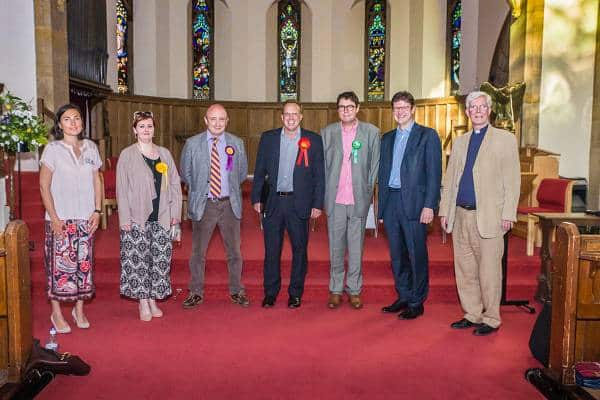AS THE six candidates hoping to represent Tunbridge Wells after next week’s General Election gathered at St James’ church for a head-to-head hustings last week, one issue was conspicuous in its absence.
Brexit, without which this election would not have been called, was not once raised by the audience members who had submitted a question to the candidates.
Around 80 people attended the hour and a half event on Friday (May 26) evening, which started with brief introductions made by the parliamentary hopefuls themselves.
Representing the Conservatives was the incumbent Greg Clark, with the recently selected Charles Woodgate pitching for Labour.
Rachel Sadler was the face of the Liberal Democrat party, while Chris Hoare, UKIP; Celine Thomas, Women’s Equality Party and Trevor Bisdee, Green Party, made up the rest of the field. Chairing the debate was Reverend Jim Stewart.
One of the first questions was on plans to swap free school lunches for free breakfasts – a change proposed by the Conservatives.
Mrs Thomas was applauded for her criticism of the change, and said: “A piece of toast and a bowl of Rice Krispies is not enough to set any child up for the day if they are not going to get a decent lunch.”
Mr Bisdee said the Conservatives wanted to save £60million, ‘at the expense of children’ while Mr Woodgate said Labour would fund more free meals through putting VAT on private school fees. The UKIP and Liberal Democrat candidates were also critical of the proposal,
Mr Clark said free school meals would still be available to those who couldn’t afford to pay for them but ‘the question is should everyone get them’? He added that ‘even in Tunbridge Wells’ there are children turning up to school unfed.
A rising bill for social care
Three questions were then amalgamated on the issue of social care and how it is funded.
Mr Clark said whoever wins power will need to address ‘a rising bill for social care’. Budgets were ‘under pressure’ and more money needs to be found for social care, some of which will come from taxation.
He acknowledged finding the right level at which to cap a personal contribution ‘has proved controversial’ and said Theresa May will consult on the maximum people should have to pay. He added the ‘right balance’ has to be found to ensure social care can be funded in the future.
Mr Woodgate said ‘better NHS funding’ was needed to alleviate problems with social care and a ‘state backed’ insurance policy system could help provide for care costs in old age as ‘private insurance will not do it.’
Ms Sadler said her party ‘approve a cap’ on what people pay, but her party is finalising the figure. She added the Liberal democrats will add 1p to income tax to provide £6billion to the NHS.
Women’s Equality Party candidate Celine Thomas proposed ‘blending health and social care’, which would save ‘in the region of £800million’ per annum but provide a more holistic approach to helping people. Her party would also take money from infrastructure spending to fund healthcare.
The Green party would also combine social care with the NHS and ‘take out all private investment’ to ensure its ‘fully publicly funded and publicly owned’ Mr Bisdee said.
Mr Hoare for UKIP, labelling his opponents as ‘big state parties’, said families should adopt a more Mediterranean model of looking after elderly relatives in their own homes.
“We cannot rely on big government and big taxes,” he said.
The candidates were also asked for their views on fox hunting, which saw Mr Clark and Mr Hoare voice support for the practice and a free vote on it, while the other candidates were strongly opposed.
All candidates, bar UKIP’s Mr Hoare, maintained their support for the Government’s legal commitment to spending 0.7 per cent of GDP on foreign aid. The Green candidate said his party were committed to raising it to 1 per cent.
Other questions asked were on the topics of abortion, Ofsted inspections of Sunday Schools, foreign policy with regards to persecuted Christians abroad and reforming the voting system.
However, speaking to the Times after the vote, several of the candidates had expressed their surprise that the issue which seemed to dominate the headlines for the past year, Brexit, did not get raised once by members of the public.








